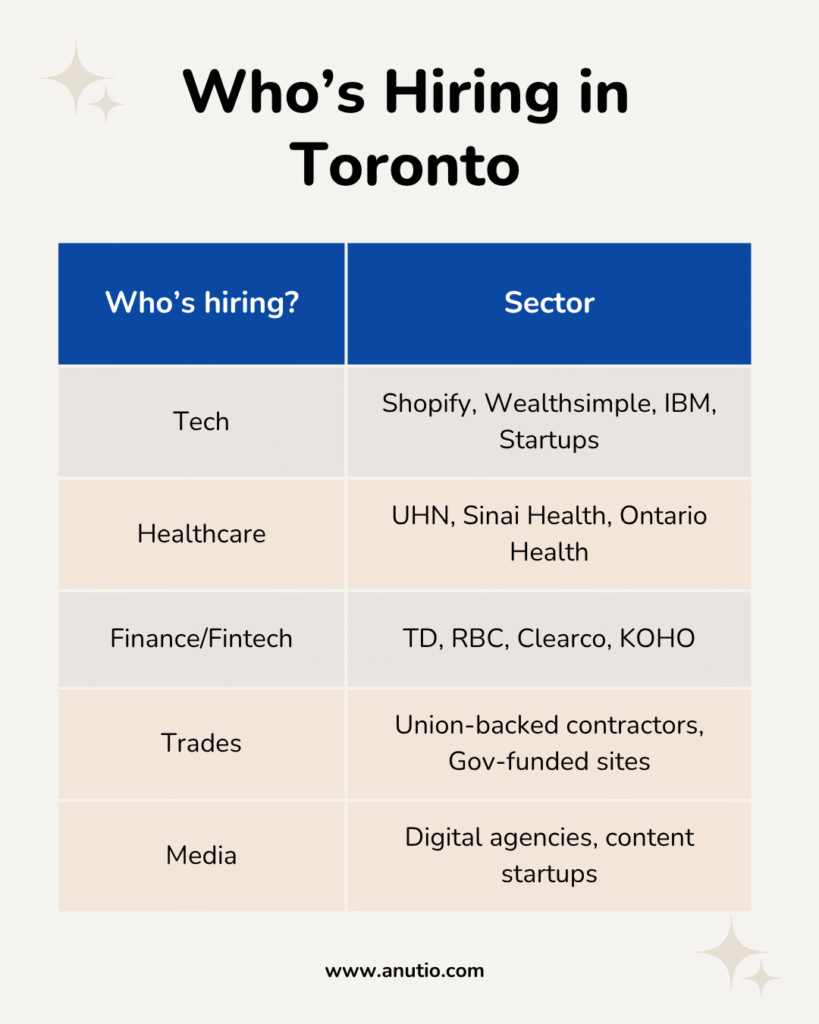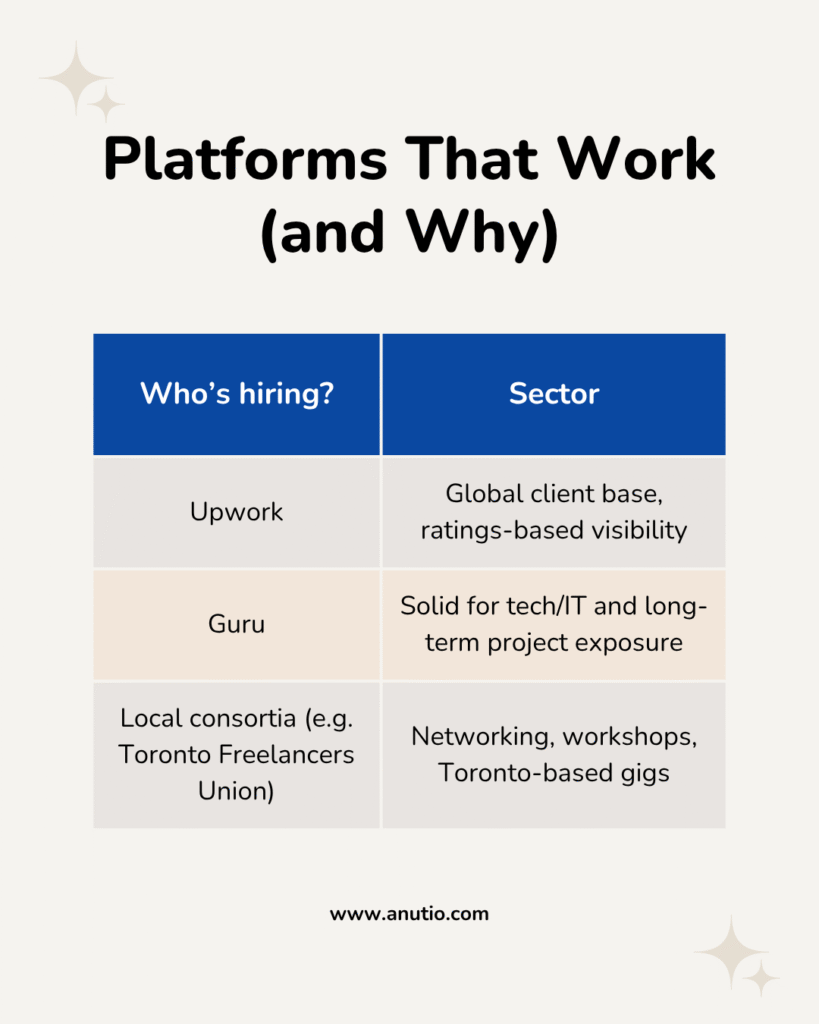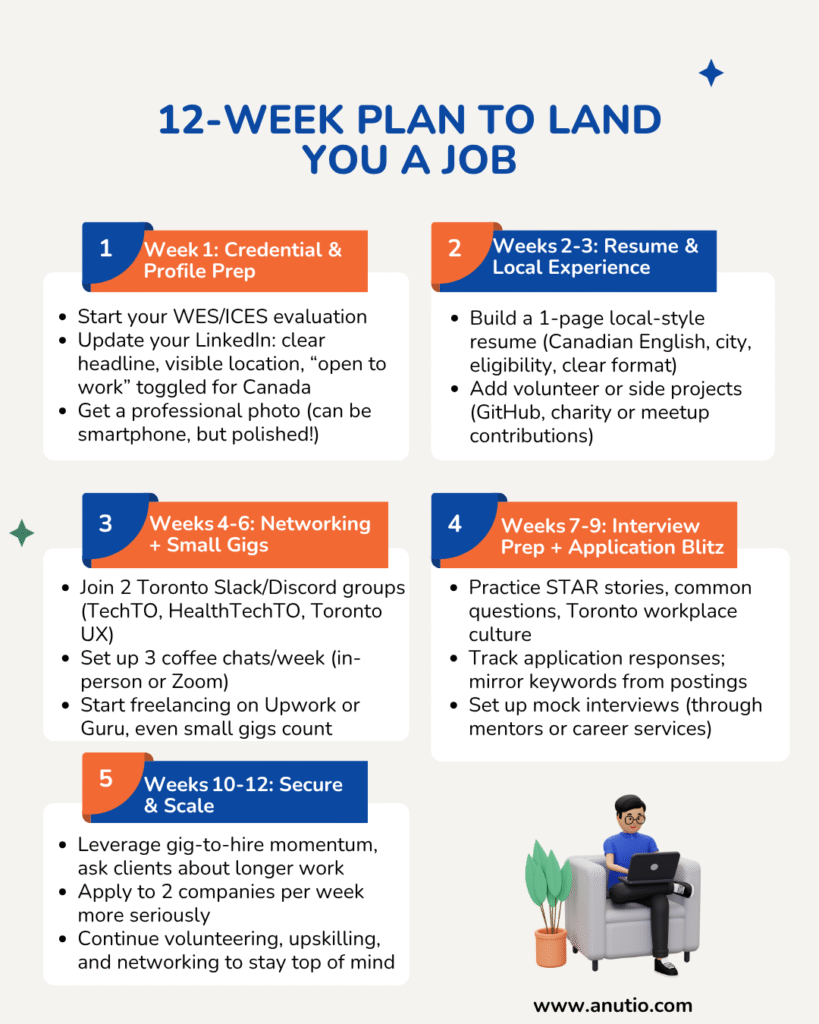A friend of mine landed in Toronto recently, full of hope. She had two degrees, polished her resume, and started applying on the very first day. By the end of the week? Nothing but auto-replies. You know the ones, “Thanks for applying, but…”
She was shocked. She kept asking me, “Why is it so hard to get a response when I know I’m qualified?”
Here’s the thing no one really tells you until you’re already frustrated: The Toronto job market isn’t broken, but it does have layers. And if you don’t know how to navigate them, especially as a newcomer, you end up feeling invisible.
Not to hand you the usual “apply through LinkedIn or Indeed” advice (which works, but only 10% of the time), in this blog, we will be showing you the real structure of the market. The unspoken norms. The referral-first culture. The timing tricks, the startup shortcuts, and the survival mindset that help you thrive when you’re not born into the network.
Toronto Employment View
A. Top Hiring Sectors & Growth Areas
Toronto is still one of the most opportunity-rich cities in North America, but you need to know where to look. The industries hiring right now aren’t always the ones we assume.
Here are the sectors pulling in talent across the board:
Tech
From AI startups to global giants like Shopify, Microsoft, and Google’s Sidewalk Labs (RIP but replaced), tech is booming. The city’s tech workforce has grown by over 40% in the last five years, and demand hasn’t slowed.
Roles in:
- Cloud infrastructure
- Data engineering
- AI/ML
- DevOps
- Frontend + backend (React, Node, Python, Go)
Healthcare
Post-COVID, Toronto’s health sector is hiring constantly, especially:
- Nurses
- PSWs
- Lab techs
- Health informatics experts (if you’ve got tech + healthcare, jackpot)
Finance & Fintech
Bay Street may look old-school, but fintech startups are popping up weekly.
- Financial analysts
- Risk & compliance
- Data-heavy roles in blockchain, credit scoring, and lending platforms
Skilled Trades
Electricians, HVAC technicians, plumbers, and construction supervisors are consistently in demand.
And yes, these jobs pay very well, often better than entry-level office roles.
Creative + Digital Media
Digital marketing, UX/UI, video content, and paid media specialists are in high demand, especially at agencies, e-commerce companies, and small businesses.
Quick breakdown:

B. Hiring Cycles & Seasonality
Timing can make or break your job search.
Peak hiring months:
- January to March – budgets reset, new roles open
- September to early November – post-summer rush to fill roles before year-end
Slow periods:
- Summer (July–Aug) – people are on vacation, hiring slows
- Mid-November to December – companies wind down for the holidays
Recruiters on Quora mention they’re less responsive during slow seasons, not because you’re unqualified, but because internal processes slow down or freeze. Use those quiet months to prep.
- Redo your resume
- Build projects
- Grow your LinkedIn
- Do informational interviews (people have more time!)
C. The Education vs. Skills Debate
In Toronto, your degree will get your foot in the door, but it won’t get you the job. You’ll find dozens of posts from international grads and immigrants saying:
“I have a Master’s, and I still couldn’t get interviews.”
“Local employers keep asking for experience, not just education.”
But here’s what employers care more about:
- Local experience
- Portfolio or project outcomes
- Communication and cultural fit
- Soft skills: time management, teamwork, problem-solving
- Your ability to jump in and contribute immediately
They want proof that you can work, not just study. That means:
- Volunteer or freelance work counts
- Open-source contributions help
- Side projects can tip the scale
- Certifications with practical projects matter more than long lists of degrees
Don’t lead with your education. Lead with what you’ve done. Then let your education support it.
Challenges for Immigrants & International Graduates
Moving to Toronto and arriving with diplomas from back home? You’re in great company. But here’s the reality: it’s not always smooth.
A. Credential Recognition
First off: those shiny overseas degrees often don’t carry the same weight here.
HR managers and recruiters see a University of Toronto diploma, and they get it. A degree from elsewhere? They may need convincing.
What to do:
- Use credential evaluators like WES or ICES right away. That gives your resume context.
- Include phrases like “Canadian-equivalent education” once your evaluation arrives.
- Add any local short courses—bootcamps, Certs, microcredentials—to reinforce that you’re current.
B. The Experience Paradox
You need Canadian experience to get a job, but you need a job to get Canadian experience. Right?
What works is strategic:
- Volunteering with organisations—like HackTO, local charities, even school tech clubs—counts.
- Internships, even unpaid or contract, open doors.
- Short-term freelance projects that solve local problems? Gold.
These help you list “Toronto experience” on your LinkedIn and resume. HR will take a second look.
C. Overcoming Bias & Building Networks
Even with the right credentials, it’s harder to break in without connections.
You may face accents, communication style differences, or cultural misunderstandings. That’s not on you, it’s a system issue. What matters is how you adapt.
Pro tips from immigrants on Quora and Reddit:
- Speak clearly, even if you’re not 100% accent-free.
- Show cultural curiosity—understand Canadian workplace norms (meetings, email tone, etiquette).
- Be proactive: ask for coffee chats rather than a cold application.
- LinkedIn and Slack active participation = visibility and referrals.
Hiring managers often say they’re looking for adaptability and coachability. Show that you can “flip the switch” by understanding local expectations.
D. Licensing & Regulation
If you’re a nurse, teacher, accountant, or in finance, don’t underestimate the licensing piece. It can take months or even years.
Action plan:
- Start early with bridging programs (like Ryerson for teachers or CNA for finance)
- Look for accelerated streams—they exist, though harder to find
- If you’re in education, get your letter from the Ontario Teachers’ Federation
- Healthcare workers—consider bridging roles or PSW work first
The faster you qualify, the sooner you can actually work in that field.
Toronto’s Hidden Job Market
You’ve probably applied to 100 postings already. Still nothing. That’s because 70–80% of jobs are never public; they live in networks and communities.
A. Referral & Community-Based Hiring
Most Canadian hires happen via referrals or internal hires. Companies are safer hiring someone people already vouch for.
How to tap in:
- Go to local meetups—TechTO (tech), charity boards, even fitness events with entrepreneurs
- Slack/Discord communities for Toronto tech groups—they’re gold
- Start with comment engagement. Then ask for an intro, share a project, and build trust
B. Personal Branding in Toronto
Here’s the difference between good candidates and great ones: visibility.
A filled-in “About” section on LinkedIn that includes your city, a friendly headshot, and your current learning projects? That’s how recruiters find you.
Feature:
- Projects with local context
- Volunteer roles in your communities
- Hackathon + open source contributions
Toronto employers love seeing you plugging into the ecosystem.
C. Targeted Networking
Sending resumes to jobs@ is easy, but it rarely works. Instead, focus on strategic networking:
- Alumni associations—from your alma mater or bootcamp often host events in Toronto.
- Professional associations like CPA Ontario or PMINTO host free or low-cost sessions.
- Lean into professional seminars and workshops—even virtual ones can be Toronto-only.
Goal: meet someone who can vouch for your fit. A real human, not a bot.
Opportunities in High‑Demand Sectors
Toronto’s not just big, it’s diverse. Let’s break down the industries that offer real chances, and how YOU can get in.
A. Tech & Startups
The tech landscape here is booming. From massive players to AI and green-tech startups, opportunities are everywhere.
What’s hot right now:
- Cloud and DevOps: AWS, Azure, GCP skills in massive demand
- AI/ML/Data: massive infrastructure and analytics teams at Shopify, DeepMind
- Full-stack (Node, React, Python): Startups love someone who can cover both ends
Why startups are worth attention:
- Less rigid titles “developer” might mean working on design, infrastructure, or user interviews
- Grants and incentives (like IRAP and SR&ED) push startups to hire quickly
Insider advice:
- Look up startups funded in the last 2 years—these are in growth mode
- Mention familiarity with grant programs in your applications
- Your freelance or side project work absolutely counts here—show it off as applicable experience
B. Healthcare & Wellness
Toronto’s health scene is hiring for both traditional and emerging roles:
- Nursing, PSWs, Lab Technicians—high demand continues post-COVID
- Health Informatics—beautiful blend of healthcare + data (expect C$70K–C$100K)
Strategy tip:
- If you come from a clinical background, a Health Informatics certification takes weeks and opens tech doors
- If you have tech skills, pair them with volunteer work in health organisations or even with APIs that integrate health data
C. Skilled Trades & Green Jobs
This is sometimes overlooked, but trades are consistently high-paying and in high demand.
- Electrical, plumbing, and HVAC trade unions are actively sponsoring newcomers
- Renewable energy work—solar panel installation, EV charger setup is growing
Steps to break in:
- Explore apprenticeships and ask about sponsorship for certification
- Even part-time clean energy projects or EV setups look solid on a future-forward resume
D. Finance & Fintech
Bay Street meets blockchain here in Toronto.
- Roles: Financial analysts, Compliance, Data roles, Blockchain
- Fintech firms: Wealthsimple, Koho, Borrowell, etc.
What ups your chances:
- Certifications like CFA, CPA, or PFP—available via Canadian bodies or night-school options
- Tech skills and certifications (Excel, SQL, Python → quantitative roles)
- Show involvement in local fintech communities—attend pitching nights or fintech meetups
E. Digital Marketing & Creative Tech
Who says Toronto isn’t digital? Agencies and startups need:
- SEO / SEM / PPC specialists
- Content creation, digital storytelling, and video editing
- UX / UI design roles paired with marketing experience
What lands interviews here:
- Project-based portfolios with real campaign outcomes
- Certifications (like Google’s Digital Marketing certificate)
- Freelance or agency background? Feature it proudly, especially if you generated real results
Overcoming Hiring Hurdles: Career‑Tactics Toolbox
Here are laid‑out tools to overcome hurdles in Toronto’s competitive job market.
A. Resume & ATS Optimisation
Toronto’s resume format is simple but specific:
- Stick to 1 page unless you’ve got 10+ years experience
- Use Canadian English (labour, centre, colour!)
- Include location and “Immigration status: Eligible to work in Canada” if applicable
Mirror the job description. If it says “AWS, Kubernetes, Terraform”, you need those exact words.
Tools: Jobscan, Resume Worded, Grammarly
B. Interview Prep
Different roles, different stages:
- Panel interviews are common at banks and startups – 3–5 people, technical + cultural questions
- Behaviorally, they want stories, use STAR (Situation, Task, Action, Result)
- Show cultural fit: The Canadian workplace relies on collaboration, communication, and adaptability
Toronto nuance: Business casual, punctuality, introductory small talk, being polite and clear go a long way
Show your work: Bring portfolios, screenshots, or demo apps. Don’t be shy, be confident in what you’ve built.
C. Building Local Experience Quickly
You’ve got to dig in:
- Volunteer: Hackathons, charity boards, tech associations
- Co-op: Several colleges offer paid co-op placements for newcomers
- Contract gigs: Even low-paid short-term projects count. List them clearly on LinkedIn and CV
- Side projects: Open-source contributions show drive and self-learning
These activities get resumes past “no local experience” filters.
D. Government Resources & Supports
Toronto offers great programs:
- Job Bank, Employment Ontario, Immigrant settlement services
- Canada-Ontario Job Grant, Digital Adoption Program: employers can get training costs covered if you know about it
- Settlement agencies like COSTI, ACCES Employment—free resume reviews, interview help, job fairs
Tip: Mention this in interviews. It shows you’re informed—and it’s often a hidden bonus.
E. Mentorship & Coaching
You aren’t alone. These resources help:
- All immigrant-serving mentorship programs: Access Employment, Ryerson Hub
- Startup mentorship from #YSL, #NEXT Canada
- Peer coaches shared in Reddit threads (people actively doing this, zero-cost)
Tactic: Apply early to community mentorship cohorts—they often accept small side projects or pair international grads with local mentors.
Navigating the Gig / Freelance Economy
Toronto’s gig economy is growing fast, and it’s not just about Uber or DoorDash. In 2022, some 624,000 Canadians reported gig work as their main job, while nearly 1.5 million took on freelance side gigs.
Why Freelance Is a Smart Entry Point
- Flexible cash flow while you job hunt
- Real-world experience to counter the “no Canadian experience” label
- A bridge to full-time. Many clients turn into referrals or outright hires
Platforms That Work (and Why)

From Freelance to Full-Time
- Showcase local problem-solving in your portfolio (ex, “Helped a Toronto bakery modernise their online ordering via React”)
- Request referrals from clients or partners
- Transition smoothly by demonstrating reliability, punctuality, and communication in your freelance contracts. Many SMEs convert reliable freelancers into full-time hires
Emerging Trends & Future Outlook
Toronto is shifting beneath our feet, and future trends matter if you want to stay ahead.
A. AI + Green Economy = Major Hiring Boom
Ontario saw 17,000+ new AI jobs in 2024–25, more than doubling last year. Over 70 AI startups launched in Toronto alone. The government is also rolling out billions in incentives for AI-powered green data centres.
B. Remote/Hybrid Work
About 78% of Toronto office workers are now operating under hybrid arrangements. And 81% of Canadians support flexible work models .
What it means for you:
You can live in Hamilton or Ottawa, but land Toronto-based roles, just show strong remote work discipline and results.
C. Economic Indicators & Government Support
- Canada is pitching $15 B+ towards green AI infrastructure, opening roles in data protection, infrastructure management, and energy optimisation.
- Reskilling grants are easier to find; check IRCC and Ontario digital adoption programs for training opportunities.
Actionable Roadmap
Here’s your 12-week plan to go from “just landed” to “working in Toronto”:

Tools:
- Roadmap template (.doc, .pdf) with checkboxes
- Sample message scripts for LinkedIn/reach-outs
- Resume layout in Google Docs
Conclusion
The immigrant advantage isn’t your past; you earn it by plugging into local networks, showcasing real work, and adapting quickly.
With resilience, adaptability, and strategy, you won’t just find a job, you’ll build a career here.






